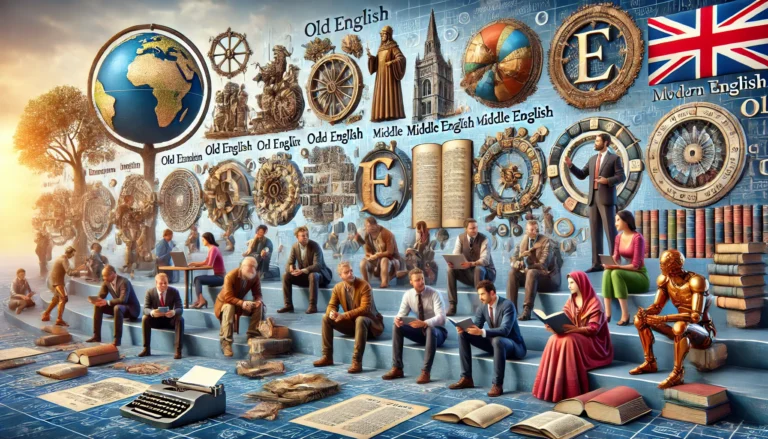The Origins of English: How It Evolved Into a Global Language
What kind of language is English, and how did it become one of the most widely spoken languages in the world? English originated from the Germanic languages brought to England by the Angles, Saxons, and Jutes in the 5th century. Over time, it absorbed vocabulary and influences from Latin, French, and Norse, making it a rich and flexible language.
Real-World Examples of English Evolution:
Old English (500–1100 AD): Resembled Germanic languages, with words like “hlaf” (loaf) and “cild” (child).
Middle English (1100–1500 AD): Influenced by Norman French, introducing words like “government,” “judge,” and “castle.”
Modern English (1500–present): Shaped by the printing press, global trade, and colonization, spreading worldwide.
For practical tips on mastering English, check out English Practice Tips 7 Effective Ways to Improve Your Skills.
Table of Contents
The Structure of English: Grammar, Syntax, and Unique Features
What kind of language is English structurally? Unlike heavily inflected languages like Latin or Russian, English relies more on word order than on case endings to indicate meaning.
🌍 Key Structural Features of English:
Subject-Verb-Object (SVO) Order: “She reads a book” rather than “A book reads she.”
Tense System: Expresses time distinctions (past, present, future) through auxiliary verbs.
Prepositions: English uses a variety of prepositions, such as “in,” “on,” and “at,” which often confuse learners.
For insights into English-speaking countries, explore What Countries Speak English 10 Places Where English is Official.
For business communication in English, visit Information about learning business English.

Linguistic Features of English: What Makes It Distinct?
What kind of language is English in terms of phonetics and vocabulary? English stands out due to its vast vocabulary, irregular spelling, and phonetic complexity.
🔎 Distinctive Linguistic Features:
Large Vocabulary: Over 170,000 words, including synonyms with slight nuances.
Phonetic Irregularity: Words like “through,” “though,” and “tough” are spelled similarly but pronounced differently.
Phrasal Verbs: “Take off,” “give up,” and “run out” often replace single verbs.
To understand where English is widely spoken, check out Countries That Speak English The Top Nations Where English Rules.
Why English is Global: The Role of Colonization, Trade, and Media
What kind of language is English in terms of its global spread? English became dominant due to British colonial expansion, international trade, and modern media.
📌 Factors Behind English’s Global Reach:
British Empire (1600s–1900s): Spread English to Asia, Africa, and the Americas.
Industrial Revolution: English became the language of science and business.
Hollywood & Technology: American media, the internet, and global brands like Google and Apple cemented English’s global role.
For professional English learning, explore Best English Speaking Course Online 6 Programs to Learn Fast.
To learn about business English, visit Business-English.info.

The History of the English Language: Key Milestones and Changes
What kind of language is English when viewed through history? English has evolved through major milestones, each adding new influences and shaping its modern form.
📖 Historical Milestones in English Development:
Roman & Anglo-Saxon Influence (1st–5th centuries): Latin and Germanic roots merged.
Norman Conquest (1066): French words entered English, influencing legal and government terms.
Shakespeare & Printing Press (1500s): Expanded vocabulary and standardized spelling.
Industrial & Digital Revolutions: Introduced words like “electricity,” “software,” and “emoji.”
For conversation practice, check out English Conversation Practice Best Daily Exercises for Fluency.
English as a Hybrid Language: Influences from Other Tongues
English is often described as a “hybrid language” because of its extensive borrowing from other languages. This flexibility has contributed to its global dominance.
🌍 Languages That Have Shaped English:
Latin & Greek: Words like “biology,” “radius,” and “exit.”
French: “Restaurant,” “ballet,” and “entrepreneur.”
German & Dutch: “Kindergarten,” “cookie,” and “freight.”
The Future of English: How It Continues to Evolve in a Changing World
What kind of language is English becoming? With globalization, technology, and shifting cultural influences, English is evolving faster than ever.
🚀 Trends Shaping the Future of English:
Rise of Global English (Globish): A simplified English used in business and international communication.
Technology-Driven Language Change: New words from social media, gaming, and AI.
Multilingual Influences: English continues absorbing slang and idioms from various cultures.
For language learning support, visit Contact Us | LearnToSpeakEnglish.info.
As English evolves, it remains the most powerful global language, bridging cultures and industries worldwide.
Related Posts

Do People in Turkey Speak English What You Should Know
Do people in Turkey speak English Learn where English is spoken and how easy it is to communicate as a traveler

Can You Speak English How to Ask and Answer Politely
Can you speak English Learn the best ways to ask and respond to this question politely in different travel and social settings

7 Books to Expand Your English Vocabulary Fast
Books to expand vocabulary help you speak and write better Discover top books that make learning new words enjoyable
